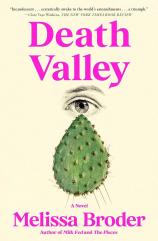Reading Group Guide
Discussion Questions
Death Valley

1. On page 1, the narrator’s friend texts her this philosophical quote from Kierkegaard: “Life is not a problem to be solved, but a reality to be experienced.” How does this idea resonate throughout the rest of the book?
2. Discuss the concept of anticipatory grief. How do the narrator, her mother and her sister cope with the omnipresent knowledge of the father’s critical condition?
3. What is the narrator’s relationship with her father like? Consider the quote: “It is easier to have an intimate relationship with the unconscious than the conscious, the dead than the living. As my father slumbered, I created a fantasy version of him --- resurrecting the man from my youth” (page 4). How does this fantasy of her father come to play a role in the novel?
4. What was your reaction when the narrator discovered the giant cactus on the trail? What did you think of the events that transpired within it?
5. On page 15, the narrator explains the Yiddish word kinehora, “a sort-of knock-on-wood that translates to ‘no evil eye.’” Discuss the role of superstition in the novel.
6. Most of the communication in the novel happens over text, email or video calls while our protagonist is otherwise isolated. How do her communication habits impact her relationships, for better or worse? What does silence or the speed of response communicate in an era of constant connection?
7. Discuss the narrator’s relationship with her husband, who is chronically ill. The two debate the meaning of the words “compassion” and “empathy.” Look up their definitions and discuss the difference. Which does she feel for her husband? Her father?
8. In chapter 18, Jethra brings up the five love languages when talking about her own father’s passing. What is your love language?
9. Discuss the quote “Being human, always new things to forgive” (page 56). Where do we see forgiveness in the novel?
10. Throughout DEATH VALLEY, the protagonist longs to feel less alone and talks to receptionists, anonymous Reddit users and even rocks. What does she get out of these interactions? Why is it sometimes easier to talk to strangers than the people we love? Do you think the talking rocks are an example of magical realism or a fabrication of our lonely narrator’s imagination?
11. What was your impression of the narrator’s novel-in-progress? Why do you think she is stuck figuring out the “desert section”? Does her own time in the desert lead to some sort of epiphany?
12. At one point while lost, our narrator remarks: “It dawns on me then that I must really want to live. And it surprises me” (page 162). How does a brush with her own mortality influence her outlook on life?
13. Have you ever found yourself in a dangerous situation because you underprepared? How did you handle it?
14. Discuss the quote “If I could define my terror --- of life and dying and loving and all of it --- if I could say, This is what it is, I would say: It keeps going. It keeps going and also it will end” (page 227). Do you find this thought comforting or terrifying?
Death Valley
- Publication Date: May 7, 2024
- Genres: Fiction, Magical Realism
- Paperback: 256 pages
- Publisher: Scribner
- ISBN-10: 1668024861
- ISBN-13: 9781668024867







